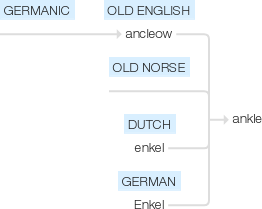Ankle
Old English ancleow, of Germanic origin; superseded in Middle English by forms from Old Norse; related to Dutch enkel and German Enkel, from an Indo-European root shared by angle1.
wiktionary
From Middle English ankel, ancle, ankyll, from Old English ancol (compare anclēow(“ankle”) > Modern English anclef, ancliff, ancley), from Proto-Germanic *ankulaz(“ankle, hip”); akin to Icelandic ökkla, ökli, Danish and Swedish ankel, Dutch enklaauw, enkel, German Enkel, Old Norse akka, Old Frisian anckel, and perhaps Old High German encha, ancha(“thigh”, “shin”), from the Proto-Germanic *ankijǭ(“ankle”, “hip”).
Compare with Sanskrit अङ्ग(aṅga, “limb”), अङ्गुरि(aṅguri, “finger”), Latin angulus. Compare haunch and Greek prefix ἀγκυλο-(ankulo-, “joint, crooked, bent”).
etymonline
ankle (n.)
14c. ancle, ankle, from Old English ancleow "ankle," ultimately from PIE root *ang-/*ank- "to bend" (see angle (n.)). The Middle English and modern form of the word seems to be from or influenced by Old Norse ökkla or Old Frisian ankel, which are immediately from the Proto-Germanic form of the root, *ankjōn-(source also of Middle High German anke "joint," German Enke "ankle").
The second element in the Old English, Old Norse and Old Frisian forms perhaps is a folk-etymology suggestion of claw (compare Dutch anklaauw), or it may be from influence of cneow "knee," or it may be the diminutive suffix -el. Middle English writers distinguished inner ankle projection (hel of the ancle) from the outer (utter or utward ancle), and the word sometimes was applied to the wrist (ankle of þe hand).
